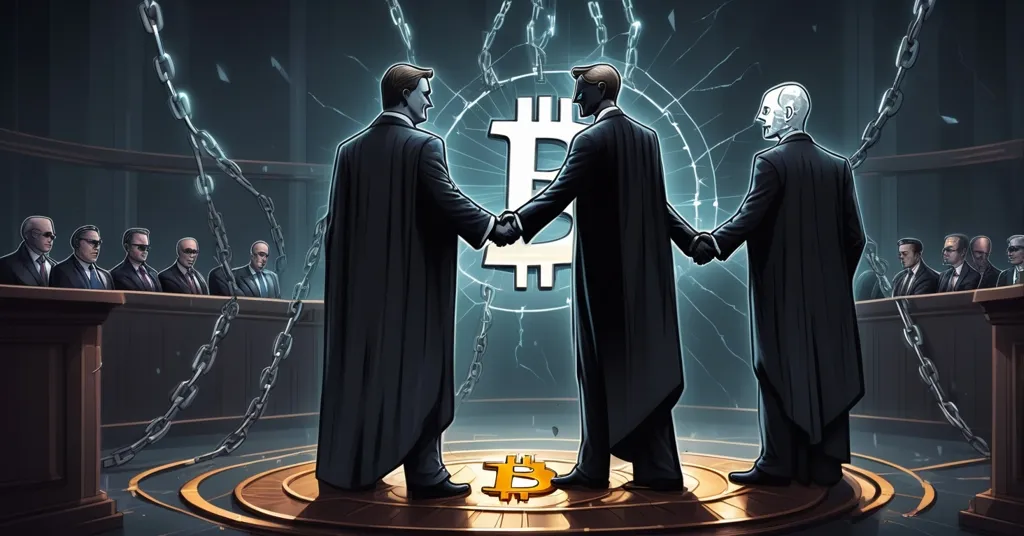Coinbase and BiT Global Settle wBTC Delisting Lawsuit: Crypto Trust Issues Exposed

Coinbase and BiT Global Settle wBTC Delisting Lawsuit: A Wake-Up Call for Crypto
Coinbase and BiT Global have called a truce in their bitter legal feud over the delisting of wrapped Bitcoin (wBTC) from Coinbase’s platform in 2024, a clash that ripped open the ugly underbelly of trust and power struggles in the crypto world. This settlement, confirmed via a joint court filing, ends a high-stakes battle but leaves lingering questions about centralized control clashing with decentralized ideals.
- Legal Truce: Coinbase and BiT Global settle wBTC delisting lawsuit with undisclosed terms, each bearing their own costs.
- Root Cause: Coinbase axed wBTC over risks tied to Justin Sun, while BiT Global claimed massive damage to liquidity and reputation.
- Bigger Picture: The dispute exposes deep cracks in trust, competition, and centralization within the crypto ecosystem.
What is Wrapped Bitcoin (wBTC) and Why Does It Matter?
For those new to the space, wBTC is a tokenized version of Bitcoin that operates on the Ethereum blockchain. It lets Bitcoin holders dive into decentralized finance (DeFi) applications—think lending, borrowing, or trading—without leaving the Bitcoin they HODL behind. Essentially, wBTC acts as a bridge between Bitcoin’s store-of-value ethos and Ethereum’s bustling smart contract playground. But here’s the catch: unlike pure Bitcoin, which is trustless thanks to its decentralized network, wBTC relies on custodians like BitGo and BiT Global to hold the actual Bitcoin that backs each token. This custodial model means you’re trusting a middleman—a setup that’s inherently at odds with the “don’t trust, verify” mantra of crypto. When trust in those custodians wavers, as it did in this case, the fallout can be brutal. For a deeper dive into how wrapped Bitcoin works, it’s worth exploring its mechanics.
The Delisting Bombshell: Coinbase’s Risk Call
The drama kicked off in 2024 when Coinbase, a heavyweight among crypto exchanges, pulled wBTC from its platform, citing “unacceptable risk” linked to Justin Sun’s involvement. Sun, the TRON founder and a lightning rod in the industry, entered the wBTC scene through a strategic partnership with BiT Global in August 2024. Known for both scaling projects and stirring controversy—think TRON’s regulatory headaches or plagiarism allegations around its whitepaper—Sun’s presence spooked Coinbase. They weren’t alone; DeFi giants like MakerDAO and Aave briefly mulled dropping wBTC as collateral (assets users lock up to borrow tokens, like a deposit on a loan) before settling on tighter risk rules. Coinbase’s stance was clear: Sun’s centralized influence over a supposedly decentralized token was a ticking time bomb they wouldn’t host. If you’re curious about the community’s take on this, there’s plenty of discussion around Justin Sun’s role in the wBTC controversy.
But let’s play devil’s advocate for a second. Is Sun really the boogeyman here, or just a convenient scapegoat? His defenders point to a track record of building—TRON processes billions in transactions—and his active support for wBTC, like his backed World Liberty Financial swapping cbBTC for wBTC holdings post-delisting. Maybe the “risk” is overblown, a narrative spun to justify other motives. Either way, Coinbase’s unilateral move sent shockwaves through DeFi, where wBTC is a cornerstone with a market cap of $13.6 billion near its all-time high. Liquidity pools—shared pots of crypto that ease trading on DeFi platforms—felt the strain as trading volume dipped, though hard stats remain murky.
BiT Global Strikes Back: A Billion-Dollar Grudge
BiT Global didn’t sit idly by as Coinbase yanked wBTC from its listings. They came out swinging, filing a lawsuit in late 2024 claiming the delisting gutted wBTC’s liquidity and trashed its reputation, seeking a staggering $1 billion-plus in damages. Their argument wasn’t just sour grapes; a major exchange like Coinbase pulling a token can tank market confidence overnight. But the real kicker was their accusation of foul play: Coinbase launched its own competing token, cbBTC, just two months before the wBTC delisting. With cbBTC—a wrapped Bitcoin variant backed by Coinbase’s custodianship, aimed at the same DeFi crowd—clocking a $4.7 billion market cap, the timing stinks of a calculated power grab. BiT Global painted Coinbase as a bully clearing the field for its shiny new toy, a charge that’s hard to dismiss outright. For more on how cbBTC’s launch competes with wBTC, the market dynamics are telling.
Legal Showdown and Silent Settlement
The courtroom clash hit an early snag for BiT Global when Judge Araceli Martinez-Olguin denied their request for a temporary restraining order to force Coinbase to relist wBTC. It was a clear signal: courts won’t meddle in an exchange’s risk calls, no matter how contentious. Still, the fight didn’t drag into a years-long slog. A joint filing recently confirmed a settlement, with BiT Global dismissing the case with prejudice—meaning no do-overs—and both sides footing their own legal bills. Beyond that, the terms are a black box. Did Coinbase offer a quiet payout? Did BiT Global concede for pragmatic reasons? We’re left guessing, but social media chatter on X shows wBTC users split—some blast Coinbase’s overreach, others shrug off Sun as a non-issue. Details on the legal resolution between Coinbase and BiT Global shed some light on the outcome.
Coinbase’s Chief Legal Officer, Paul Grewal, didn’t mince words post-settlement, posting on X:
“This important win affirms our clear right to manage security and risk for Coinbase users… we will not be bullied into continuing to list an asset that puts our customers at risk.”
That’s a hard line on user protection, doubling down on their delisting rationale. Meanwhile, BitGo CEO Mike Belshe scoffed at the Sun backlash as a “big nothingburger,” hyping BitGo’s security creds. The divide couldn’t be sharper: one sees a red flag, the other a fabricated crisis. For further insight into the specific terms of the lawsuit settlement, recent updates provide some context.
Centralized Power Laid Bare: Coinbase’s Iron Grip
Peel back the layers, and this wBTC delisting drama exposes a raw truth about crypto in 2024-2025: centralized exchanges like Coinbase hold way too much sway. Their decisions shape which tokens thrive or wither, rippling through DeFi liquidity and user trust. Coinbase’s own financials add context—Q1 earnings showed revenue up 24% to $2 billion, but net income cratered 94% to $66 million, slammed by crypto asset write-downs (losses when held crypto’s value tanks). In a brutal market, delisting wBTC might be less about Sun and more about survival—playing it safe to dodge further hits. But let’s not buy their “user protection” excuse wholesale. It feels like a flimsy shield for market dominance, far from the decentralized dream we’re fighting for. Bitcoin maximalists in our crowd will nod—wBTC, with its custodial baggage, ain’t the real BTC anyway. The broader impact of centralized exchanges on DeFi tokens like wBTC is worth considering.
Yet here’s the flip side: altcoins and cross-chain tools like wBTC, built on Ethereum, fill niches Bitcoin shouldn’t touch. DeFi’s innovation—however flawed—needs these bridges, even if they come with middleman risks. Look at past custodial scares, like the 2019 Bitfinex hack, where trust in third parties was shaken. wBTC’s model will always invite skepticism, and smaller DeFi protocols relying on it felt the delisting pinch, scrambling to adjust collateral or pivot tokens. This isn’t just a Coinbase-BiT Global spat; it’s a stress test for the ecosystem. Some perspectives on why Coinbase chose to delist wBTC highlight the stakes involved.
What’s Next for wBTC and DeFi Trust?
As the dust settles, wBTC remains a DeFi heavyweight despite the scars. But its custodial core keeps the trust question alive—can a token tethered to middlemen ever embody Bitcoin’s spirit? Probably not, though damn, it’s useful if you stomach the baggage. Coinbase, for all its clout, walks a tightrope between safeguarding users and flexing market muscle. Their cbBTC push shows they’re hungry to own the wrapped Bitcoin game, but at what cost to community faith? And let’s not forget Justin Sun, the chaos agent who keeps the pot boiling, for better or worse. For a detailed breakdown of the risks tied to Justin Sun’s involvement, the specifics are eye-opening.
Here’s where our effective accelerationism (e/acc) lens kicks in: this messy feud, while a headache, might just turbocharge innovation. If centralized gatekeepers like Coinbase keep playing hardball, and custodial models keep sparking doubt, DeFi could be forced to rethink wrapped assets altogether—pushing us faster toward truly trustless solutions. That’s the silver lining in this dumpster fire. But the bigger question looms: if exchanges can kill a token’s reach on a whim, are we building a revolution or just a fancier version of Wall Street?
Key Takeaways and Burning Questions on the wBTC Dispute
- What triggered Coinbase’s decision to delist wBTC?
Coinbase pointed to “unacceptable risk” tied to Justin Sun’s partnership with wBTC starting in August 2024, citing concerns over centralized influence as a threat to user safety. - Why did BiT Global sue Coinbase over the delisting?
BiT Global claimed the move crushed wBTC’s liquidity and reputation, seeking over $1 billion in damages, and accused Coinbase of prioritizing its rival token, cbBTC, launched just months earlier. - What came out of the legal battle between Coinbase and BiT Global?
They settled with undisclosed terms, BiT Global dropped the case permanently, and both parties covered their own legal costs after a judge denied a relisting order. - How does Justin Sun’s involvement affect trust in wBTC?
Sun’s controversial history with TRON and perceived control over projects raised alarms for Coinbase and DeFi platforms like Aave, spotlighting risks of centralized power in decentralized tokens. - What does this reveal about centralized exchanges in crypto?
Coinbase’s ability to delist tokens underscores their outsized influence over market dynamics, often clashing with crypto’s permissionless ethos and impacting DeFi’s reach. - Should exchanges like Coinbase have unchecked power to delist assets?
This sparks fierce debate—some see it as necessary risk management, others as a betrayal of decentralization, stifling innovation and handing gatekeepers too much control. - Can custodial tokens like wBTC align with Bitcoin’s trustless ideals?
Hardly; relying on middlemen inherently invites trust issues, as this fiasco proves, though their utility in DeFi keeps them relevant despite the philosophical clash.



